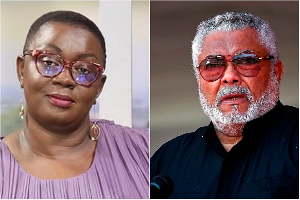Accra, Dec. 15, GNA- Professor Stephen Adei, a renowned Economist, on Tuesday expressed reservation to the popular thought that government should earmark 10 per cent of oil wealth to Western Region saying the act raised issues of ownership of mineral resources by the state. Prof. Adei, who is currently the Professor of Economics and Leadership at the Pentecost University College, said government needed to address development deficits in the country using the national budget instead of earmarking the nation's resources to a particular region as if the country were a federal state.
He was speaking at a public lecture organized by the William Ofori Atta Heritage in Accra to commemorate the Centenary Celebration of the birth of Mr William Eugene Ofori Atta, one of the legendary "Big Six". The topic for the lecture was; "The Quest for Servant Leadership in Ghana and in Africa." Prof Adei expressed dismay that poor leadership styles together with corruption and acts of violence had beleaguered the African continent. He said there was an emerging consensus that much of Africa's contemporary problem had been the result of leadership failure and weakness adding that Ghana was no exception.
Prof Adei said: "even on the Ghanaian scene, a casual review of the media and pronouncement of political leaders seem to suggest that the only business in town is how to cling to political power in 2012 to have control of state resources to lubricate patronage networks and satisfy partisan interest rather than to serve the Republic." He decried the unbridled quest for political power on the part of some politicians to advance their selfish interest stressing that Ghanaians needed to generate alternative avenue of creating wealth outside political patronage.
Prof Adei expressed hope though that the intervention of global political and economic trends as well as the information, communication technology revolution would present the continent with the opportunity to choose and reward good leadership skills.
"The emerging African models, continental initiates to reward good governance, emerging possibilities of leadership capacity building, growing civil society leadership, increasing cost of bad leadership with prosecution of impunity as well as the growing strength of the media to advance the course of good governance are reasons for hope."
Prof Adei said: "we need to raise the bar regarding the qualification for leadership to cover character, competence and care to improve the selection criteria for leaders." Strengthening national accountability system, leadership training and education both formal and competency enhancing forms, reducing room for corrupt leaders to gain public office for personal gain as well as a strong national civic education programme were some factors he suggested would contribute to improving the supply and demand of good national leadership. Prof Adei paid glowing tribute to Mr William Ofori Atta stressing that he was an example of a leader who was first and foremost a servant. He called on politicians, aspiring leaders and the youth to emulate his good qualities.
Mr Ofori Atta was a lawyer, politician and an evangelist who joined renowned political figures such as Dr J.B. Danquah to found the United Gold Coast Convention party to which Kwame Nkrumah later acted as its secretary. The Public lecture was well patronized by top-ranking members in the society including Dr Kwame Addo Kufuor, former Minister of Defence of the erstwhile New Patriotic Party (NPP) and Mr Atta Kyea, a lawyer and NPP Member of Parliament for Akim Abuakwa South.
Dr Kufuor said he had learnt three things from the public lecture which needed to be espoused to advance the socio-economic agenda of the country.
They included selfless leadership style and the rewards of hard work and discipline.
Prof. Akosua Adomako Ampofo, Director of the Institute of African Studies, Legon, called on the youth to take a cue from the consequences of bad leadership in order to make a difference. 15 Dec. 10
Business News of Wednesday, 15 December 2010
Source: GNA












